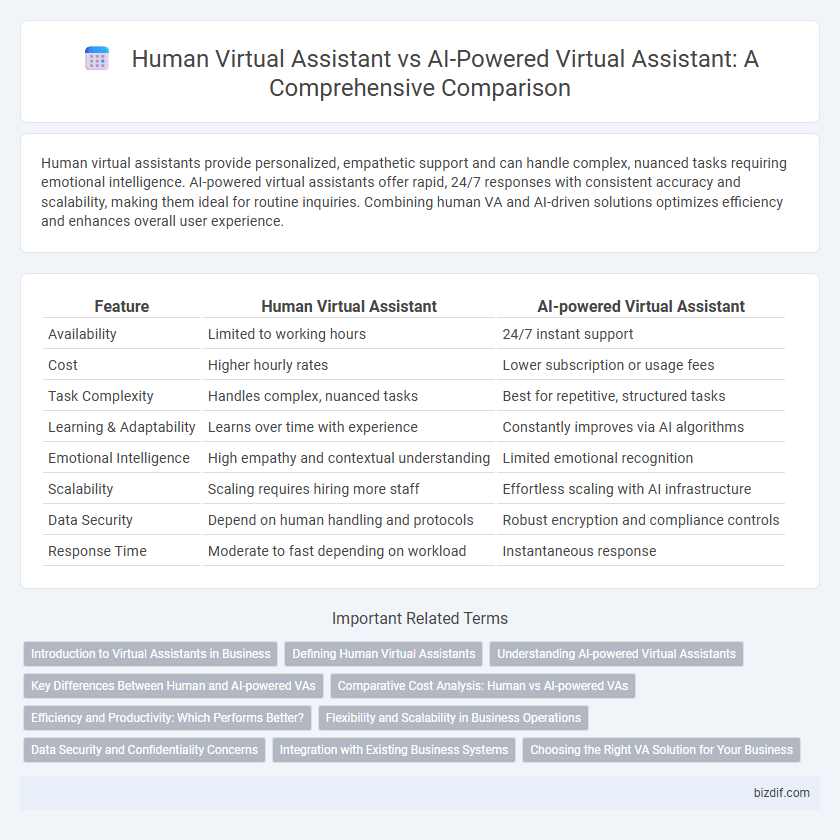Human virtual assistants provide personalized, empathetic support and can handle complex, nuanced tasks requiring emotional intelligence. AI-powered virtual assistants offer rapid, 24/7 responses with consistent accuracy and scalability, making them ideal for routine inquiries. Combining human VA and AI-driven solutions optimizes efficiency and enhances overall user experience.
Table of Comparison
| Feature | Human Virtual Assistant | AI-powered Virtual Assistant |
|---|---|---|
| Availability | Limited to working hours | 24/7 instant support |
| Cost | Higher hourly rates | Lower subscription or usage fees |
| Task Complexity | Handles complex, nuanced tasks | Best for repetitive, structured tasks |
| Learning & Adaptability | Learns over time with experience | Constantly improves via AI algorithms |
| Emotional Intelligence | High empathy and contextual understanding | Limited emotional recognition |
| Scalability | Scaling requires hiring more staff | Effortless scaling with AI infrastructure |
| Data Security | Depend on human handling and protocols | Robust encryption and compliance controls |
| Response Time | Moderate to fast depending on workload | Instantaneous response |
Introduction to Virtual Assistants in Business
Virtual assistants in business streamline operations by managing tasks such as scheduling, customer support, and data entry. Human virtual assistants offer personalized interaction and adaptability, while AI-powered virtual assistants provide scalability, 24/7 availability, and rapid data processing. Integrating both types enhances efficiency and allows businesses to leverage human creativity alongside AI precision.
Defining Human Virtual Assistants
Human virtual assistants are trained professionals capable of handling complex tasks requiring emotional intelligence, creativity, and nuanced judgment. They excel in personalized customer service, project management, and multitasking across various platforms with adaptive problem-solving skills. Human VAs bring empathy and adaptability that AI-powered assistants currently cannot fully replicate.
Understanding AI-powered Virtual Assistants
AI-powered virtual assistants leverage advanced machine learning algorithms and natural language processing to understand and respond to user inquiries with high accuracy and efficiency. Unlike human VAs, these digital assistants can handle multiple tasks simultaneously, providing 24/7 availability and rapid data retrieval from vast information databases. Their continuous learning capabilities enable personalized interactions, improving over time to adapt to user preferences and behavioral patterns.
Key Differences Between Human and AI-powered VAs
Human virtual assistants excel in tasks requiring emotional intelligence, complex problem-solving, and nuanced communication, making them ideal for personalized customer service. AI-powered virtual assistants provide rapid data processing, 24/7 availability, and can handle repetitive tasks with consistent efficiency, optimizing operational workflows. Key differences lie in adaptability to human subtleties, continuous learning capabilities, and integration with advanced technologies such as natural language processing and machine learning.
Comparative Cost Analysis: Human vs AI-powered VAs
Human virtual assistants typically incur higher costs due to salaries, benefits, and training expenses, averaging $15 to $50 per hour depending on expertise and location. AI-powered virtual assistants, leveraging automation and machine learning, offer scalable solutions with lower ongoing operational costs, often priced as low as a few cents per interaction or a monthly subscription fee. Businesses evaluating virtual assistant solutions must consider these cost factors alongside task complexity and customization needs to determine the most cost-effective option.
Efficiency and Productivity: Which Performs Better?
AI-powered virtual assistants outperform human VAs in efficiency and productivity by automating repetitive tasks, processing large volumes of data instantly, and operating 24/7 without fatigue. Human VAs excel in complex decision-making, emotional intelligence, and personalized communication, which AI currently cannot fully replicate. However, for businesses prioritizing scalability and rapid task completion, AI virtual assistants deliver superior performance.
Flexibility and Scalability in Business Operations
Human virtual assistants offer unparalleled flexibility in handling complex, nuanced tasks requiring emotional intelligence and real-time judgment, adapting seamlessly to dynamic business needs. AI-powered virtual assistants excel in scalability, managing high volumes of repetitive tasks efficiently and providing consistent performance without fatigue, ideal for businesses experiencing rapid growth. Integrating both solutions can optimize operational efficiency, leveraging human adaptability alongside AI's capacity for scaling routine processes.
Data Security and Confidentiality Concerns
Human virtual assistants provide personalized service but may pose higher risks in data security and confidentiality due to potential human error or intentional breaches. AI-powered virtual assistants leverage advanced encryption and secure protocols to minimize unauthorized data access, enhancing protection for sensitive information. Organizations must assess their risk tolerance and compliance requirements when choosing between human VA and AI-powered VA for handling confidential data.
Integration with Existing Business Systems
Human virtual assistants excel in navigating complex business environments, leveraging emotional intelligence to seamlessly integrate with CRM platforms and project management tools. AI-powered virtual assistants offer rapid data processing and automation capabilities, easily syncing with APIs across various enterprise systems like ERP and communication software. Hybrid solutions combine the nuanced understanding of human VAs with AI's efficiency, optimizing workflow integration within existing business infrastructures.
Choosing the Right VA Solution for Your Business
Selecting the right virtual assistant (VA) solution depends on your business needs, budget, and desired level of personalization. Human VAs offer nuanced understanding, empathy, and adaptive problem-solving, making them ideal for complex tasks that require emotional intelligence. AI-powered VAs provide scalability, 24/7 availability, and cost efficiency, excelling in handling repetitive queries and data-driven operations.
Human VA vs AI-powered VA Infographic

 bizdif.com
bizdif.com